Incubating future movements in travel and culture
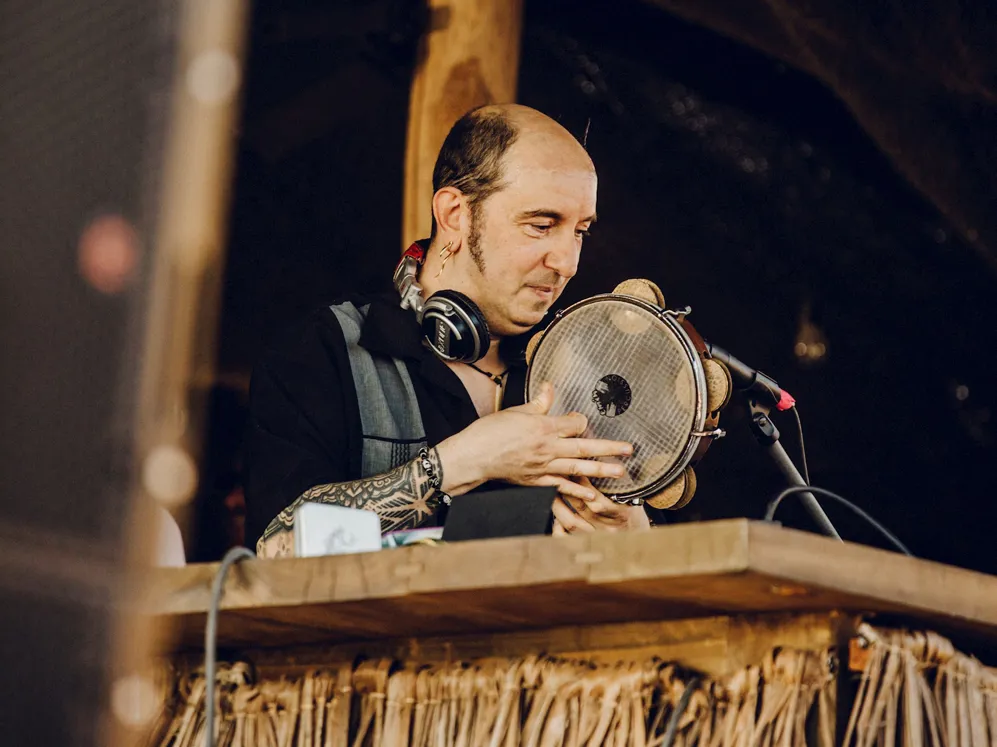
Words Karen Orton
Ask Mercan Dede what he does for a living and you might not get an easy answer. “This is the hardest question,” said the self-styled “multidisciplinary explorer,” speaking with us at Further Mykonos. The Turkish musician, producer, artist, and composer synthesizes Sufi music and traditions with contemporary electronic sounds to create an entirely original sonic amalgam. At the vanguard of a new breed of pioneers who are reinvigorating sacred music and bridging east and west, Dede’s work has gained a growing global following, not least for his mesmerizing live shows featuring whirling Dervishes that bring Sufism to life. Based between Montreal and Istanbul, Dede plays the ney himself, and works with musicians who play the violin, clarinet, and the zither. He has released over 10 albums to date and played at shows and festivals around the world, from the World Roots Festival to Burning Man. He has also composed music for a dance piece by Pina Bausch and been featured in Fatih Akin's documentary on Istanbul’s music scene, “Crossing the Bridge.”
Can you tell me about your approach to music?
Mercan Dede: My approach to music is parallel to my approach to life. I have to be honest: it’s not intellectual. It comes more from the heart. I believe when things come from heart, they reach people in that same way. Because of this approach, I had to begin by trying to figure out where I’m coming from and who I am. I was born in Turkey, and I live between Montreal and Istanbul. I am blessed with two beautiful cities. Istanbul is the meeting point between east and west. My home is in Europe; my work is in Asia. So this bridge between east and west is quite influential—there is something rooted and tribal, and yet a very futuristic digital meeting point between these two. Probably most importantly, Istanbul is also about the meeting point between North and South—the high and low. To be connected to this place and to create music from this standpoint is what’s important. In all my albums and in almost every concert, I start with a heartbeat and end with a heartbeat. And when I played here, the last piece was the heartbeat. That’s pretty much what life is about.
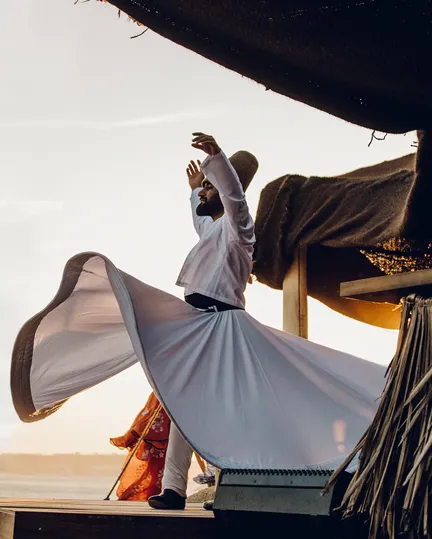
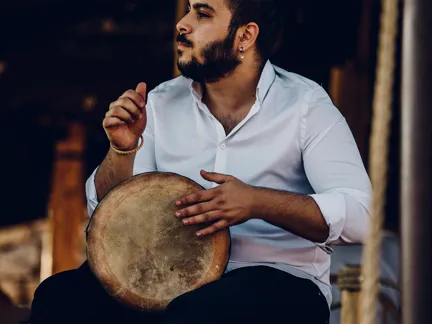
How would you define the evolution of your musical style?
Dede: Well, I’m very lucky because all of my musicians are people I’ve played with for many, many years. My percussion player was five years old when we start touring. When you work with amazing musicians—both in recording music and live—your approach becomes about creating live moments around that. Technically speaking, I try to be as minimal as possible in using computers, cables, and all of that, so you can really connect with a simple instrument. In that sense, I don’t see DJing as different to playing a traditional percussion or flute. We call them instruments. They're all instruments. You give them the meaning. So it's a beautiful counterpoint between the technology and something acoustic and real.
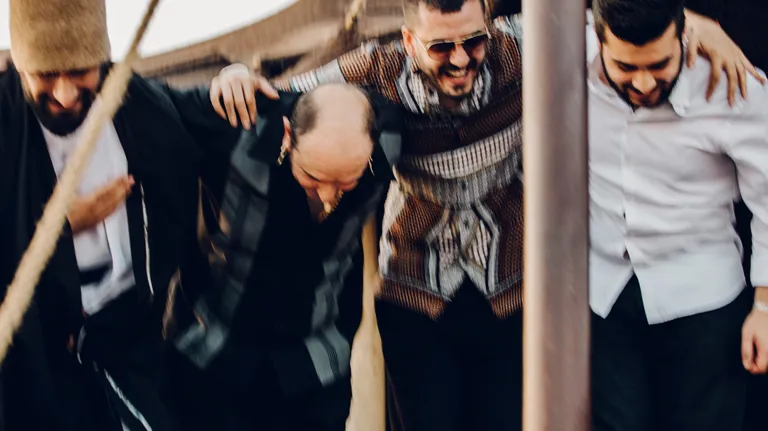
What is the potential for musical fusion?
Dede: I remember on a radio program on the BBC almost 20 years ago, they asked me what I thought the future of the music would be. I said the same thing that I say today—action, reaction. When we push ahead with technology, we need to then connect it back to our roots, so it means something. Because at the end, we are a heartbeat and our blood is moving this whole machine. It doesn’t matter whether I play for large audience or small. I always think that the percussion should be connected to this connection between technology and our roots. Then something unique will come out. And now, we are pushing towards more technology, not only in music but in life itself—it’s amazing—but we are still primal. We see this beautiful Mediterranean ocean, where I was born. The sand, the seagulls—you hear that. All of these things are primal elements. And at the end, when you look at any big parties from Burning Man to the festivals we have in Montreal now, like this great Piknic Électronik—with groups of people who come together, most of them are around the circle and the percussion and they dance together. We shouldn’t lose who we are originally. Technology is amazing, as long as we use it. But when technology starts using us, then we are losing something very, very important. Then what does it mean to be human and what does it mean for the human spirit?
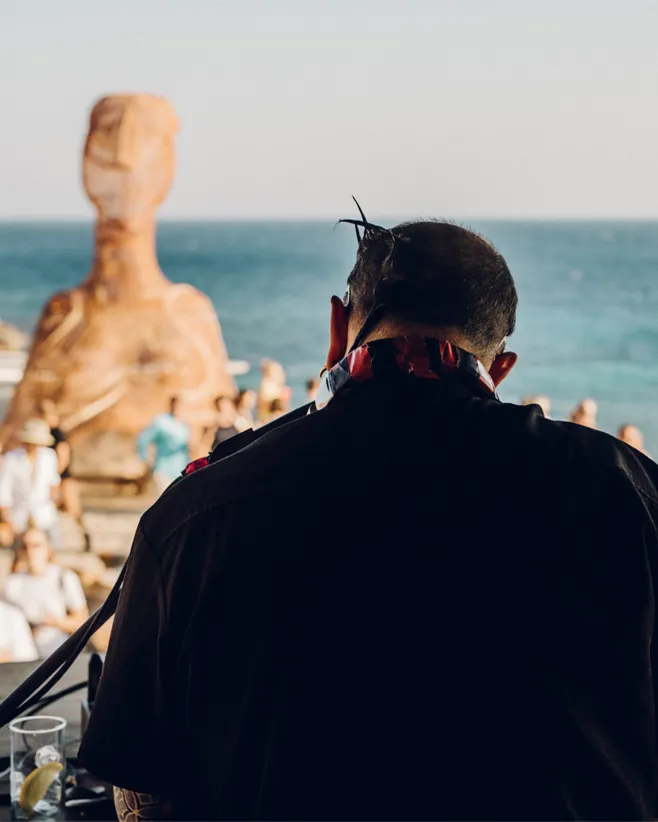
“When we push ahead with technology, we need to then connect it back to our roots, so it means something.”
Mercan Dede
Do you feel that we are living through a resurgence of festival culture?
Dede: Big time, big time. In that sense I think Burning Man is a very good example of that. It’s very tribal. You are in the middle of the desert, and yeah, you have the technology and the lights and lasers, but at the end of the night, you always end up around a small fire. So I think that’s who we are. The more we are moving towards Mars, the moon, and the human intellectual mind — the more we will need to connect to who we are in spirit. There are a lot of artists emerging who are doing this, not only in music but also in visual art. One of the most beautiful installations I saw at Burning Man last year was what looked like a bunch of small, old speakers from the outside—almost like an igloo—and then you crawl inside and you put the headphones on and there was a heartbeat and breathing—you hear many different things. So it’s really amazing that we are not forgetting our origin and where we came from, and remembering that we are really stardust—and that dust is now manifesting in our breath and our heartbeat. That’s why I think that the most incredible percussion is our heartbeat. We need to reconnect to that.
Do you think there is a responsibility to teach the audience?
Dede: Well, it’s strange, I’ve never seen myself as either a musician nor an artist. I think the first responsibility we all have, every single individual living being on this planet, is to be really honest and try to find who we are. We think we know who we are, but we don’t necessarily know who we are under the skin. There’s another spirit in there. So my first responsibility to try to figure out who I am, to be honest with that, and then to be sure that the art—whichever form is that is, music, DJing, visual arts, painting—reflects that. The most magical part about art and music is that it works as a mirror. When people look into it, if they can see something about themselves. If they hear a gypsy playing percussion and they connect to that, then I think our mission is accomplished. We became who we are in that oneness. We are all here from different parts of the planet, but at the essence we come together. I think that is the magic of music. The music really brings the people together and all those labels melt away, whether old or young, Muslim, Christian, or Turkish. It is really important that people realize that at the end, we are in one big ship. We call it Earth. We should take better care of it.
The Eternal Festival

French architect Arthur Mamou-Mani is pioneering a new direction in temporary architecture, employing cutting-edge digital technology and radical new perspectives on shared space.
The Eternal Festival

Further meets Persian-French opera singer Ariana Vafadari, who takes enigmatic Zoroastrian prayers from 3700 BC and transforms them into haunting operatic pieces that speak to 21st-century festival goers.